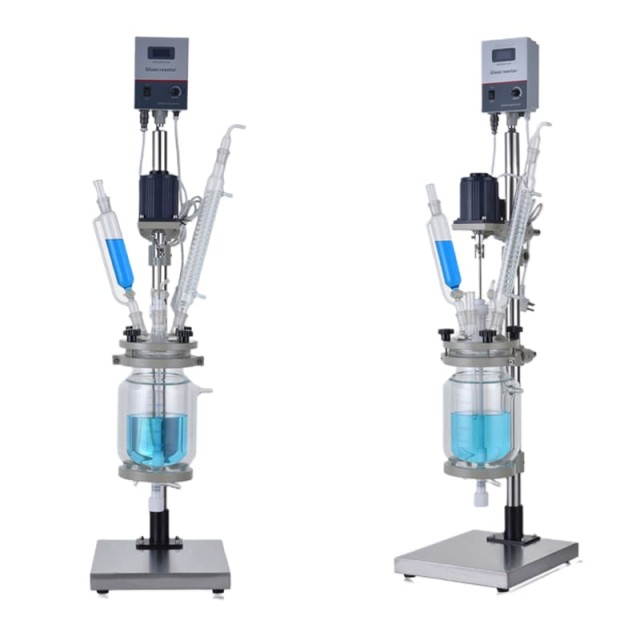
Glass Reactor
1-5L Jacketed Glass Reactor Vessel Lab Glass Reactor
Item Number : KR-1
Price varies based on specs and customizations
- Reactor Volume
- 1-5 L
- Jacket Volume
- 0.3-1.5 L
- Funnel size
- 0.2-0.5 L
- Stirring Speed
- 0-1300 rpm
- Working temperature
- -80~250 ℃
- Vacuum
- 0.098 Mpa

Shipping:
Contact us to get shipping details Enjoy On-time Dispatch Guarantee.
Applications
Glass reactor system combines the glassware vessel, speed controlled stirring, controlled temperature heating or chilling, as while as filtering, lifting, or tilting mechanical functions, which creates an idea environment for the different target materials synthetic reaction, distillation, separation and filtration in the pharmaceutical, chemical, biological products and other industries.
KinTek glass reactors vessel volumes are from 1 liters to 200 liters,glassware can be single, double and triple jacketed, stirring system can be fixed speed or various speed adjustable, agitating shaft and impeller can be different materials or assembling, reactor assemble can be lift-able and tilt-able for convenient materials handling, standard input and output ports for heating or chilling circulating, also supply various optional functions like filtering assembling, anti-explosive controls, warm keep jacket, heating jacket and so on. Kindle tech also offer reactor custom tailor service, client just text us the working purpose and requests, we will work out detail plan proposals to our clients.
Features
- Hand-made food grade borosilicate glassware, high transparent, smooth fluid surface
- Wide range glassware temperature working adaptability , varies from -43°C up to 200°C
- Accurate stirring speed control and strong agitating power,guarantee the material even mixing
- Heavy duty and compact support framework design, durable working and space saving
- Solvent-resistant vales and sealing rings, make material reaction result more stable
- PTFE valve material prevent reacting with samples, keep the purity of sample material
- Multiple safety protections for dry running,over temperature and ground power failures
- Optional anti-explosive system, filtering system, warm keep jacket, heating jacket to meet particular working purpose
Technical specifications

| Model | KGR-1 | KGR-2 | KGR-3 | KGR-5 |
| Reactor Volume | 1L | 2L | 3L | 5L |
| Jacket Volume | 0.3L | 0.6L | 0.9L | 1.5L |
| Funnel size | 0.2L | 0.2L | 0.2L | 0.5L |
| Vacuum Sealing | Telflon+Viton Sealing | |||
| Speed Control | Knop Stepless Speed Regulation | |||
| Stirring Speed | 0-1300rpm | |||
| Working temperature | -80~250℃ | |||
| Vacuum | 0.098Mpa | |||
| Safty Protection | Over-current/ ground fault/over-temperature protection | |||
| Working Environment | 5-35℃ | |||
| Power Supply | 110-440V, 50/60Hz | |||
| Overall Dimensions | 480*420*1110 mm | 480*420*1110 mm | 480*420*1110 mm | 591*520*1594mm |
| Net weight | 19kg | 20kg | 21kg | 34kg |
Warnings
Operator safety is the top important issue! Please operate the equipment with cautions. Working with inflammable& explosive or toxic gases is very dangerous, operators must take all necessary precautions before starting the equipment. Working with positive pressure inside the reactors or chambers is dangerous, operator must fellow the safety procedures strictly. Extra caution must also be taken when operating with air-reactive materials, especially under vacuum. A leak can draw air into the apparatus and cause a violent reaction to occur.
Designed for You
KinTek provide deep custom made service and equipment to worldwide customers, our specialized teamwork and rich experienced engineers are capable to undertake the custom tailoring hardware and software equipment requirements, and help our customer to build up the exclusive and personalized equipment and solution!
Would you please drop your ideas to us, our engineers are ready for you now!
FAQ
What Are The Main Types Of Laboratory Glassware?
What Are The Applications Of Laboratory Glassware?
What Are The Advantages Of Using Borosilicate Glass In Laboratory Glassware?
How Does Borosilicate Glass Enhance The Efficiency Of Laboratory Processes?
What Makes PTFE Glassware Suitable For Handling Corrosive Substances?
4.8
out of
5
The 5L glass reactor is a game-changer in my lab. It's durable and easy to regulate, making it a reliable workhorse.
4.7
out of
5
The jacketed glass reactor is an absolute must-have for precise temperature control. It's a versatile piece of equipment that streamlines my experiments.
4.9
out of
5
I'm thoroughly impressed with the quality of the borosilicate glass used in the 1-5L reactor. It's crystal clear and resistant to chemicals, ensuring accurate observations.
4.6
out of
5
The 5L glass reactor is an excellent choice for small-scale reactions. Its compact size saves valuable bench space, yet it delivers exceptional performance.
4.8
out of
5
The jacketed glass reactor has simplified my temperature regulation needs. It's efficient and maintains precise temperatures, leading to consistent experimental results.
4.9
out of
5
The 1-5L reactor is a great investment for my lab. It's durable, easy to clean, and provides accurate temperature control, making it a reliable workhorse.
4.7
out of
5
The jacketed glass reactor is a game-changer in my lab. It's a versatile piece of equipment that enables precise temperature control and allows for easy monitoring of reactions.
4.6
out of
5
The 1-5L glass reactor is a solid choice for small-scale reactions. It's well-made, easy to use, and provides accurate temperature control, making it a dependable addition to my lab.
4.8
out of
5
The jacketed glass reactor is an excellent choice for reactions requiring precise temperature control. It's a well-designed piece of equipment that delivers reliable performance.
4.7
out of
5
The 1-5L glass reactor is a great addition to my lab. It's durable, easy to clean, and provides accurate temperature control, making it a valuable tool for my experiments.
4.9
out of
5
The jacketed glass reactor is a must-have for my lab. It's a versatile piece of equipment that enables precise temperature control and allows for easy monitoring of reactions.
4.6
out of
5
The 1-5L glass reactor is a solid choice for small-scale reactions. It's well-made, easy to use, and provides accurate temperature control, making it a dependable addition to my lab.
4.8
out of
5
The jacketed glass reactor is an excellent choice for reactions requiring precise temperature control. It's a well-designed piece of equipment that delivers reliable performance.
4.7
out of
5
The 1-5L glass reactor is a great addition to my lab. It's durable, easy to clean, and provides accurate temperature control, making it a valuable tool for my experiments.
4.9
out of
5
The jacketed glass reactor is a must-have for my lab. It's a versatile piece of equipment that enables precise temperature control and allows for easy monitoring of reactions.
4.6
out of
5
The 1-5L glass reactor is a solid choice for small-scale reactions. It's well-made, easy to use, and provides accurate temperature control, making it a dependable addition to my lab.
4.8
out of
5
The jacketed glass reactor is an excellent choice for reactions requiring precise temperature control. It's a well-designed piece of equipment that delivers reliable performance.
4.7
out of
5
The 1-5L glass reactor is a great addition to my lab. It's durable, easy to clean, and provides accurate temperature control, making it a valuable tool for my experiments.
REQUEST A QUOTE
Our professional team will reply to you within one business day. Please feel free to contact us!
Related Products

1-5L Single Jacketed Glass Reactor Vessel for Lab Use
Find your ideal glass reactor system for synthetic reactions, distillation, and filtration. Choose from 1-200L volumes, adjustable stirring and temperature control, and custom options. KinTek has you covered!

Lifting Tilting Jacketed Glass Reactor Vessel for Lab Use
Enhance your synthetic reactions, distillation, and filtration processes with our lifting/tilting glass reactor system. With a wide range of temperature adaptability, accurate stirring control, and solvent-resistant valves, our system guarantees stable and pure results. Explore the features and optional functions today!
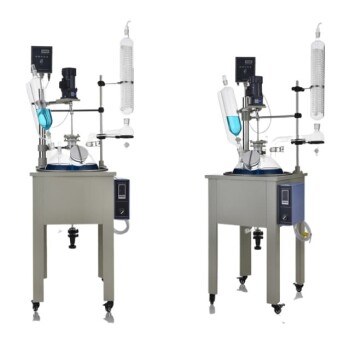
10-50L Single Jacketed Glass Reactor Vessel for Lab Applications
Looking for a reliable single glass reactor system for your lab? Our 10-50L reactor offers precise temperature and stirring control, durable support, and safety features for synthetic reactions, distillation, and more. KinTek's customizable options and tailored services are here to meet your needs.
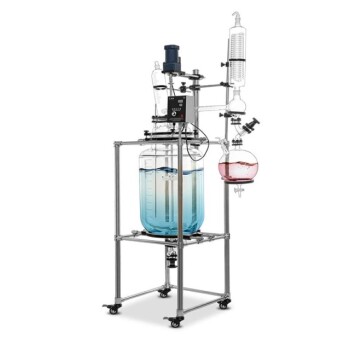
10-50L Jacketed Glass Reactor Vessel for Lab Applications
Discover the Versatile 10-50L Jacket Glass Reactor for Pharmaceutical, Chemical, and Biological Industries. Accurate Stirring Speed Control, Multiple Safety Protections, and Customizable Options Available. KinTek, Your Glass Reactor Partner.
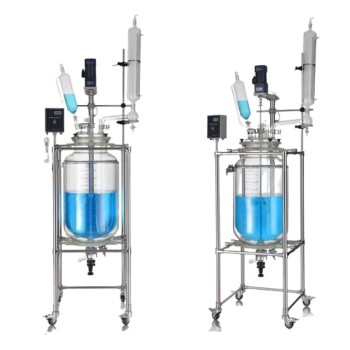
80-150L Jacketed Glass Reactor Vessel for Lab Applications
Looking for a versatile jacket glass reactor system for your lab? Our 80-150L reactor offers controlled temperature, speed, and mechanical functions for synthetic reactions, distillation, and more. With customizable options and tailored services, KinTek has you covered.
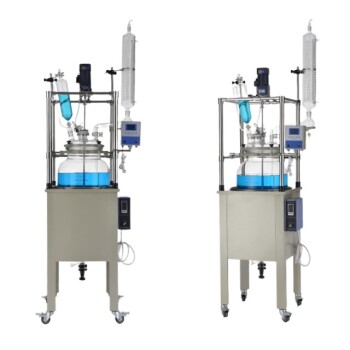
80-150L Single Jacketed Glass Reactor Vessel for Lab Use
Looking for a glass reactor system for your lab? Our 80-150L single glass reactor offers controlled temperature, speed, and mechanical functions for synthetic reactions, distillation, and more. With customizable options and tailored services, KinTek has you covered.
Related Articles

5 Essential Applications of Rotary Evaporator in Labs
Rotary evaporators, also known as rotovaps, are laboratory instruments used for distillation, concentration, and purification of samples. They are widely used in the chemical, pharmaceutical, and food and beverage industries for various applications.

From Chemistry to Cooking The Versatility of Rotary Vacuum Evaporator
A rotary vacuum evaporator is a laboratory equipment that uses a rotating flask to remove solvents from a sample. It works by creating a vacuum in the system, which lowers the boiling point of the solvent and allows it to evaporate at lower temperatures.

From Lab to Kitchen The Versatile Applications of Rotary Evaporator
A rotary evaporator, also known as a rotovap, is a laboratory device used for separating solvents from samples using evaporation. The device consists of a rotating flask and a condenser that is cooled by either air or water.

Choosing the Right Rotary Vacuum Evaporator for Your Lab
Rotary vacuum evaporators are essential tools for any laboratory that needs to concentrate or isolate solutions. These devices work by heating a sample under vacuum to increase its surface area and effectively remove solvent.

Enhancing Safety in Your Laboratory: A Comprehensive Guide to Pressure Reactor Safety
Laboratory safety isn't just about you. Improper preparation and mishandling can cause potential hazards that could be disastrous if left unchecked. It is crucial to take the time to carefully prepare your pressure reactor and lab safety equipment, as even minor problems can escalate quickly when working under pressure.

Exploring the Boundless Possibilities of Rotary Evaporator in Culinary Arts
A rotary evaporator is an essential laboratory equipment that is used for solvent removal, separation, and recycling. It is a device that uses a rotating flask to remove solvents from a sample, making it ideal for sample preparations and drying powders.

What Is Rotary Evaporator Used For?
A rotary evaporator (or rotavap/rotovap) is a device used in chemical laboratories for the efficient and gentle removal of solvents from samples by evaporation.

Enhancing Flavor Extraction Rotary Evaporators in Molecular Gastronomy
Molecular gastronomy is a scientific discipline that studies the physical and chemical processes that occur during cooking. This field of study combines physics and chemistry with culinary arts to create new cooking techniques and innovative dishes.

Cooking with a Rotary Evaporator A New Way to Enhance Your Dishes
A rotary evaporator, also known as a rotovap, is a laboratory equipment used for distillation.

10 Essential Safety Steps for Pressure Reactor Use in Laboratories
Safety is paramount when conducting chemical reactions under pressurized conditions. It is important to carefully prepare pressure reactors and laboratory safety equipment to prevent potential hazards that, if not controlled, can have catastrophic consequences. In order to ensure the safety of using a pressure reactor, it is important to understand the specifications of the reactor. Become familiar with the chemistry of the reactor material and make sure it is chemically resistant enough to withstand the substances used in the reaction.

Exploring the Science Behind Rotary Evaporators: How They Work and Their Applications
Rotary evaporators, also known as rotovaps or rotating evaporators, are commonly used in labs to remove solvents from samples or to create concentrated solutions. These devices work by rotating a flask or sample container at a high speed while simultaneously heating and evaporating the solvent.

Expanding Possibilities with Rotavapor An Innovative Solution for Solvent Evaporation
Solvent evaporation is an essential process in many industries, including pharmaceuticals, food and beverage, and chemical manufacturing, among others.